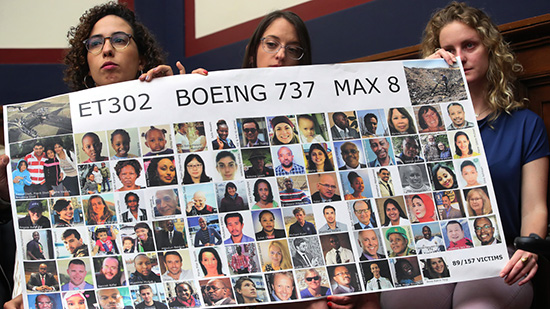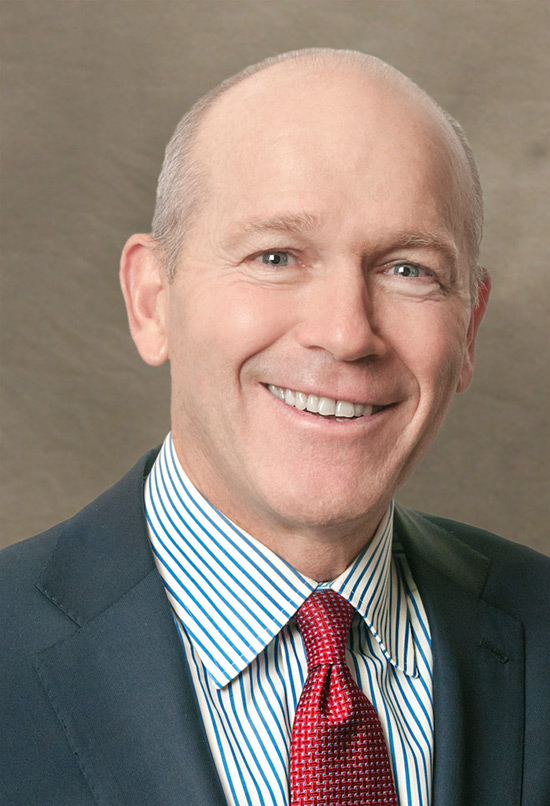
從1月13日起,,大衛(wèi)·卡爾霍恩將履新波音首席執(zhí)行官一職,成為該公司在短短不到五年時(shí)間內(nèi)的第四任首席執(zhí)行官,。
卡爾霍恩有著豐富的工作經(jīng)驗(yàn),,在加入波音前曾供職于不同行業(yè)的多家知名公司,擁有輝煌的職業(yè)生涯,,曾在黑石集團(tuán),、卡特彼勒和尼爾森控股等公司擔(dān)任高管。
熟識(shí)卡爾霍恩的人對(duì)他的評(píng)價(jià)很高,,在他們眼中,,卡爾霍恩既是一位圓融的管理者,擅于平衡盈虧,,又是 “救火隊(duì)長”一般的人物,。而現(xiàn)在,要想將這家麻煩纏身的美國企業(yè)拖出泥潭,,卡爾霍恩將不得不充分發(fā)揮自己的這兩種能力,。
美國財(cái)政部部長史蒂夫·姆努欽在1月12日接受福克斯新聞采訪時(shí)表示:“作為美國最大的出口商之一,,波音的問題將毫無疑問地拖累美國的GDP,,波音737 Max飛機(jī)停飛或?qū)?dǎo)致今年GDP降低50個(gè)基點(diǎn)?!贝朔哉撘策m時(shí)地提醒了人們,,波音要想扭轉(zhuǎn)局面難度何其大。
可以說,,卡爾霍恩接手的是波音公司乃至現(xiàn)代商業(yè)史上最大的爛攤子,。圣誕前夕,波音的董事會(huì)要求卡爾霍恩擔(dān)任公司新任掌門,,并帶領(lǐng)這家經(jīng)歷了獅航和埃航兩起空難(共造成346人喪生)的航空及國防巨頭走出困境,,而怎么看這都像是個(gè)無法完成的任務(wù)。
要想完成使命,,他必須重獲投資者,、供應(yīng)商,、消費(fèi)者和雇員的信任,修復(fù)與監(jiān)管機(jī)構(gòu)之間的關(guān)系,,同時(shí)改變自以為是的企業(yè)文化,。從近期公開的內(nèi)部員工間信息可以清楚看出,這種企業(yè)文化已經(jīng)在管理層和員工之間造成了裂痕,,在公開的信息里,,波音 737 MAX的設(shè)計(jì)師被稱為“小丑”,而公司的主管則被稱為“猴子”,。此外,,他還必須完成前任首席執(zhí)行官丹尼斯·米倫伯格未能完成的使命——讓波音 737 MAX復(fù)飛。
留給他的時(shí)間不多了,。
卡爾霍恩需要盡快取得進(jìn)展,,一方面是因?yàn)橘Y金消耗巨大,僅2019年第三季度,,波音就消耗了41億美元現(xiàn)金,,另一方面,各方面對(duì)波音公司也越來越?jīng)]有耐心,。他將成為整個(gè)商界最為關(guān)注的人物之一,,而且無論他是否愿意,在未來很長的一段時(shí)間內(nèi),,他都將會(huì)出現(xiàn)在許多商學(xué)院的案例研究之中,。

局內(nèi)人做局外人的工作
有人認(rèn)為,,由于卡爾霍恩在波音董事會(huì)任職已經(jīng)有10年之久,,而且波音 737 MAX飛機(jī)正是在其監(jiān)管下發(fā)生嚴(yán)重問題,因而他并不是新任首席執(zhí)行官的最佳人選,。也有批評(píng)聲音認(rèn)為,,卡爾霍恩此前從未擔(dān)任過飛機(jī)制造公司的負(fù)責(zé)人,也不像大多數(shù)波音的掌門人一樣擁有工程背景,。
耶魯大學(xué)管理學(xué)院資深副院長,、萊斯特克朗教授(管理實(shí)踐)杰弗里·索恩菲爾德并不認(rèn)可這一觀點(diǎn),他說:“卡爾霍恩在公司內(nèi)外都享有盛譽(yù),,各方面都對(duì)他青睞有加,。他與華爾街和工程界保持著極好的關(guān)系,在通用電氣負(fù)責(zé)飛機(jī)相關(guān)業(yè)務(wù)時(shí)積累下的權(quán)威現(xiàn)在依然有用,?!?
卡爾霍恩在處理企業(yè)危機(jī)方面也具有豐富的經(jīng)驗(yàn),2017年,,在他擔(dān)任卡特彼勒董事長期間,,曾經(jīng)成功應(yīng)對(duì)過多個(gè)聯(lián)邦機(jī)構(gòu)對(duì)該公司展開的稅收欺詐突襲調(diào)查,。
雖然不是工程師,但卡爾霍恩曾在通用電氣公司任職達(dá)26年之久,,曾負(fù)責(zé)通用電氣的飛機(jī)發(fā)動(dòng)機(jī)和運(yùn)輸(飛機(jī)和鐵路)部門,。卡內(nèi)基梅隆大學(xué)的工程與公共政策教授杰伊·艾普特表示,,工程背景并不一定是幫助波音公司逆轉(zhuǎn)局勢的關(guān)鍵,。
“波音737 MAX出現(xiàn)軟件問題時(shí),整個(gè)組織都是工程師們?cè)谪?fù)責(zé),?!卑仗乇硎尽,!安ㄒ粽嬲枰氖且环N安全文化。創(chuàng)建這種文化需要的是認(rèn)真對(duì)待安全問題的領(lǐng)導(dǎo)人,,而不一定要有工程背景,。董事會(huì)、首席執(zhí)行官和首席風(fēng)險(xiǎn)官都必須全心投入安全文化的創(chuàng)建之中,,他們需要明確表示:‘時(shí)間表很重要,,但沒有安全,公司將萬劫不復(fù),?!?
卡爾霍恩的另一個(gè)優(yōu)勢是他對(duì)公司的了解,波音是一家擁有13萬員工的龐大公司,,從未在波音工作過的外部人士難免會(huì)缺乏對(duì)公司運(yùn)營情況和企業(yè)文化的了解,。索恩菲爾德說:“即便人選合適,外人要想勝任首席執(zhí)行官的工作也得花費(fèi)18個(gè)月的時(shí)間來學(xué)習(xí),?!倍柣舳鲃t是知己知彼,同時(shí)也得到了波音董事長,、美國大陸航空前負(fù)責(zé)人勞倫斯·凱爾納和首席財(cái)務(wù)官格雷格·史密斯的支持(史密斯在過去三周中擔(dān)任臨時(shí)首席執(zhí)行官),。索恩菲爾德表示,這種支持至關(guān)重要,,他還將卡爾霍恩稱為“老波音優(yōu)秀文化的傳承者”,。
對(duì)于一直在燒錢的波音而言,時(shí)間至關(guān)重要,。在2019年的前9個(gè)月中,,波音的經(jīng)營現(xiàn)金流為負(fù)的2.26億美元,而2018年的同期數(shù)字為124億美元,。據(jù)報(bào)道,,波音欲進(jìn)行50億美元債務(wù)融資,,以彌補(bǔ)成本。
上市公司高管業(yè)績分析機(jī)構(gòu)Management CV發(fā)布的一份客戶報(bào)告指出,,“經(jīng)營現(xiàn)金流的突然下降導(dǎo)致公司杠桿大幅提升,,或?qū)⑵茐钠渑c供應(yīng)商的關(guān)系?!?
財(cái)務(wù)問題出在商用飛機(jī)部門,,而該部門的收入占波音總收入的60%以上。截至目前,,波音仍然在竭力避免裁員行動(dòng),。然而,在波音 737 MAX復(fù)飛前,,如果不采取類似的激進(jìn)措施,,波音將無法堵上財(cái)務(wù)窟窿。
現(xiàn)金流并不是波音面臨的唯一問題,。Tigress Financial Partners是一家為大型投資者提供咨詢的公司,,同時(shí)也為客戶持有部分波音公司股票,其首席投資官兼研究總監(jiān)伊萬·費(fèi)恩塞斯認(rèn)為,,波音公司需要拿出計(jì)劃,,讓波音 737 MAX能夠最遲在初夏實(shí)現(xiàn)復(fù)飛。
重建信任
波音 737 MAX復(fù)飛,、重建信任都絕非易事,。波音與美國聯(lián)邦航空管理局(FAA)和全球其他監(jiān)管機(jī)構(gòu)的關(guān)系已經(jīng)破裂。Fox Rothschild的航空法律業(yè)務(wù)合伙人兼聯(lián)席主席馬克·多姆羅夫表示:“波音的首要任務(wù)是恢復(fù)其與監(jiān)管機(jī)構(gòu)的關(guān)系,?!?
他指出,最近公布的波音內(nèi)部電子郵件內(nèi)容令人憤怒,,從這些郵件可以看出波音藐視監(jiān)管的態(tài)度,。“某種程度上說,,有些郵件的內(nèi)容可能被解讀為對(duì)FAA監(jiān)管的嘲弄,。”
這顯然不是波音第一次藐視監(jiān)管機(jī)構(gòu),。彼得·戈?duì)柶澱f:“波音對(duì)我們的態(tài)度一直很強(qiáng)硬,。”彼得·戈?duì)柶澞壳笆钦凸碴P(guān)系公司O'Neill and Associates的高級(jí)副總裁,,曾于1996年至2000年間擔(dān)任美國國家運(yùn)輸安全委員會(huì)(NTSB)的董事總經(jīng)理,。20世紀(jì)90年代,NTSB曾處理過兩起波音737墜毀事故,,其中涉及方向舵動(dòng)力控制單元故障,,在某些情況下,,該故障會(huì)使方向舵轉(zhuǎn)向與飛行員意圖相背,跟現(xiàn)在出現(xiàn)的問題在很多方面都頗為相似,。戈?duì)柶澅硎荆骸爸钡阶詈笠豢?,波音都在想方設(shè)法阻撓我們的工作?!?
現(xiàn)在,,波音737 MAX能否復(fù)飛、何時(shí)復(fù)飛都由FAA決定,。因而修復(fù)雙方關(guān)系對(duì)波音而言至關(guān)重要,。重新建立他人對(duì)波音飛機(jī)性能的信任也是如此。波音 737 MAX飛機(jī)停飛,,急需的新飛機(jī)也遲遲無法交付,,讓全球的航空公司都深受困擾,企業(yè)運(yùn)營也受到不利影響,。例如,,美國航空集團(tuán)便將波音訴至法庭,要求賠償(該航空公司表示,,波音737 MAX飛機(jī)停飛令其2019年的稅前利潤損失達(dá)5.4億美元),最終雙方達(dá)成部分和解,。
飛機(jī)停飛也對(duì)消費(fèi)者造成了不利影響,。有些航空公司不得不取消了原本可由波音 737 MAX執(zhí)飛的一些航班。也有航空公司不得不削減成本和/或提高票價(jià),。此外,,航空旅客對(duì)再次搭乘波音737 MAX也深感不安。
還有波音的數(shù)千家供應(yīng)商,。
投資銀行公司Cassel Salpeter&Co.的航空業(yè)務(wù)主管約瑟夫·史密斯表示:“波音對(duì)供應(yīng)商通常極為強(qiáng)硬,。”波音737 MAX飛機(jī)的停飛,、停產(chǎn)讓許多供應(yīng)商苦不堪言,。波音最大的供應(yīng)商Spirit AeroSystems Holdings剛剛裁員20%,多達(dá)2800名工人,。
卡爾霍恩必須在有限的時(shí)間內(nèi)同時(shí)解決上述所有問題,。索恩菲爾德將卡爾霍恩面臨的任務(wù)稱為“英雄般的使命”。
開工大吉,。(財(cái)富中文網(wǎng))
譯者:梁宇
審校:夏林
從1月13日起,,大衛(wèi)·卡爾霍恩將履新波音首席執(zhí)行官一職,成為該公司在短短不到五年時(shí)間內(nèi)的第四任首席執(zhí)行官,。
卡爾霍恩有著豐富的工作經(jīng)驗(yàn),,在加入波音前曾供職于不同行業(yè)的多家知名公司,,擁有輝煌的職業(yè)生涯,曾在黑石集團(tuán),、卡特彼勒和尼爾森控股等公司擔(dān)任高管,。
熟識(shí)卡爾霍恩的人對(duì)他的評(píng)價(jià)很高,在他們眼中,,卡爾霍恩既是一位圓融的管理者,,擅于平衡盈虧,又是 “救火隊(duì)長”一般的人物,。而現(xiàn)在,,要想將這家麻煩纏身的美國企業(yè)拖出泥潭,卡爾霍恩將不得不充分發(fā)揮自己的這兩種能力,。
美國財(cái)政部部長史蒂夫·姆努欽在1月12日接受??怂剐侣劜稍L時(shí)表示:“作為美國最大的出口商之一,波音的問題將毫無疑問地拖累美國的GDP,,波音737 Max飛機(jī)停飛或?qū)?dǎo)致今年GDP降低50個(gè)基點(diǎn),。”此番言論也適時(shí)地提醒了人們,,波音要想扭轉(zhuǎn)局面難度何其大,。
可以說,卡爾霍恩接手的是波音公司乃至現(xiàn)代商業(yè)史上最大的爛攤子,。圣誕前夕,,波音的董事會(huì)要求卡爾霍恩擔(dān)任公司新任掌門,并帶領(lǐng)這家經(jīng)歷了獅航和埃航兩起空難(共造成346人喪生)的航空及國防巨頭走出困境,,而怎么看這都像是個(gè)無法完成的任務(wù),。
要想完成使命,他必須重獲投資者,、供應(yīng)商,、消費(fèi)者和雇員的信任,修復(fù)與監(jiān)管機(jī)構(gòu)之間的關(guān)系,,同時(shí)改變自以為是的企業(yè)文化,。從近期公開的內(nèi)部員工間信息可以清楚看出,這種企業(yè)文化已經(jīng)在管理層和員工之間造成了裂痕,,在公開的信息里,,波音 737 MAX的設(shè)計(jì)師被稱為“小丑”,而公司的主管則被稱為“猴子”,。此外,,他還必須完成前任首席執(zhí)行官丹尼斯·米倫伯格未能完成的使命——讓波音 737 MAX復(fù)飛。
留給他的時(shí)間不多了。
卡爾霍恩需要盡快取得進(jìn)展,,一方面是因?yàn)橘Y金消耗巨大,,僅2019年第三季度,波音就消耗了41億美元現(xiàn)金,,另一方面,,各方面對(duì)波音公司也越來越?jīng)]有耐心。他將成為整個(gè)商界最為關(guān)注的人物之一,,而且無論他是否愿意,,在未來很長的一段時(shí)間內(nèi),他都將會(huì)出現(xiàn)在許多商學(xué)院的案例研究之中,。
局內(nèi)人做局外人的工作
有人認(rèn)為,,由于卡爾霍恩在波音董事會(huì)任職已經(jīng)有10年之久,而且波音 737 MAX飛機(jī)正是在其監(jiān)管下發(fā)生嚴(yán)重問題,,因而他并不是新任首席執(zhí)行官的最佳人選,。也有批評(píng)聲音認(rèn)為,卡爾霍恩此前從未擔(dān)任過飛機(jī)制造公司的負(fù)責(zé)人,,也不像大多數(shù)波音的掌門人一樣擁有工程背景,。
耶魯大學(xué)管理學(xué)院資深副院長、萊斯特克朗教授(管理實(shí)踐)杰弗里·索恩菲爾德并不認(rèn)可這一觀點(diǎn),,他說:“卡爾霍恩在公司內(nèi)外都享有盛譽(yù),,各方面都對(duì)他青睞有加。他與華爾街和工程界保持著極好的關(guān)系,,在通用電氣負(fù)責(zé)飛機(jī)相關(guān)業(yè)務(wù)時(shí)積累下的權(quán)威現(xiàn)在依然有用,。”
卡爾霍恩在處理企業(yè)危機(jī)方面也具有豐富的經(jīng)驗(yàn),,2017年,,在他擔(dān)任卡特彼勒董事長期間,,曾經(jīng)成功應(yīng)對(duì)過多個(gè)聯(lián)邦機(jī)構(gòu)對(duì)該公司展開的稅收欺詐突襲調(diào)查,。
雖然不是工程師,但卡爾霍恩曾在通用電氣公司任職達(dá)26年之久,,曾負(fù)責(zé)通用電氣的飛機(jī)發(fā)動(dòng)機(jī)和運(yùn)輸(飛機(jī)和鐵路)部門,。卡內(nèi)基梅隆大學(xué)的工程與公共政策教授杰伊·艾普特表示,,工程背景并不一定是幫助波音公司逆轉(zhuǎn)局勢的關(guān)鍵,。
“波音737 MAX出現(xiàn)軟件問題時(shí),整個(gè)組織都是工程師們?cè)谪?fù)責(zé),?!卑仗乇硎尽!安ㄒ粽嬲枰氖且环N安全文化,。創(chuàng)建這種文化需要的是認(rèn)真對(duì)待安全問題的領(lǐng)導(dǎo)人,,而不一定要有工程背景。董事會(huì),、首席執(zhí)行官和首席風(fēng)險(xiǎn)官都必須全心投入安全文化的創(chuàng)建之中,,他們需要明確表示:‘時(shí)間表很重要,但沒有安全,,公司將萬劫不復(fù),。’”
卡爾霍恩的另一個(gè)優(yōu)勢是他對(duì)公司的了解,,波音是一家擁有13萬員工的龐大公司,,從未在波音工作過的外部人士難免會(huì)缺乏對(duì)公司運(yùn)營情況和企業(yè)文化的了解。索恩菲爾德說:“即便人選合適,,外人要想勝任首席執(zhí)行官的工作也得花費(fèi)18個(gè)月的時(shí)間來學(xué)習(xí),。”而卡爾霍恩則是知己知彼,,同時(shí)也得到了波音董事長,、美國大陸航空前負(fù)責(zé)人勞倫斯·凱爾納和首席財(cái)務(wù)官格雷格·史密斯的支持(史密斯在過去三周中擔(dān)任臨時(shí)首席執(zhí)行官)。索恩菲爾德表示,,這種支持至關(guān)重要,,他還將卡爾霍恩稱為“老波音優(yōu)秀文化的傳承者”。
對(duì)于一直在燒錢的波音而言,,時(shí)間至關(guān)重要,。在2019年的前9個(gè)月中,波音的經(jīng)營現(xiàn)金流為負(fù)的2.26億美元,,而2018年的同期數(shù)字為124億美元,。據(jù)報(bào)道,波音欲進(jìn)行50億美元債務(wù)融資,,以彌補(bǔ)成本,。
上市公司高管業(yè)績分析機(jī)構(gòu)Management CV發(fā)布的一份客戶報(bào)告指出,“經(jīng)營現(xiàn)金流的突然下降導(dǎo)致公司杠桿大幅提升,,或?qū)⑵茐钠渑c供應(yīng)商的關(guān)系,。”
財(cái)務(wù)問題出在商用飛機(jī)部門,,而該部門的收入占波音總收入的60%以上,。截至目前,波音仍然在竭力避免裁員行動(dòng),。然而,,在波音 737 MAX復(fù)飛前,如果不采取類似的激進(jìn)措施,波音將無法堵上財(cái)務(wù)窟窿,。
現(xiàn)金流并不是波音面臨的唯一問題,。Tigress Financial Partners是一家為大型投資者提供咨詢的公司,同時(shí)也為客戶持有部分波音公司股票,,其首席投資官兼研究總監(jiān)伊萬·費(fèi)恩塞斯認(rèn)為,,波音公司需要拿出計(jì)劃,讓波音 737 MAX能夠最遲在初夏實(shí)現(xiàn)復(fù)飛,。
重建信任
波音 737 MAX復(fù)飛,、重建信任都絕非易事。波音與美國聯(lián)邦航空管理局(FAA)和全球其他監(jiān)管機(jī)構(gòu)的關(guān)系已經(jīng)破裂,。Fox Rothschild的航空法律業(yè)務(wù)合伙人兼聯(lián)席主席馬克·多姆羅夫表示:“波音的首要任務(wù)是恢復(fù)其與監(jiān)管機(jī)構(gòu)的關(guān)系,。”
他指出,,最近公布的波音內(nèi)部電子郵件內(nèi)容令人憤怒,,從這些郵件可以看出波音藐視監(jiān)管的態(tài)度?!澳撤N程度上說,,有些郵件的內(nèi)容可能被解讀為對(duì)FAA監(jiān)管的嘲弄?!?
這顯然不是波音第一次藐視監(jiān)管機(jī)構(gòu),。彼得·戈?duì)柶澱f:“波音對(duì)我們的態(tài)度一直很強(qiáng)硬?!北说谩じ?duì)柶澞壳笆钦凸碴P(guān)系公司O'Neill and Associates的高級(jí)副總裁,,曾于1996年至2000年間擔(dān)任美國國家運(yùn)輸安全委員會(huì)(NTSB)的董事總經(jīng)理。20世紀(jì)90年代,,NTSB曾處理過兩起波音737墜毀事故,,其中涉及方向舵動(dòng)力控制單元故障,在某些情況下,,該故障會(huì)使方向舵轉(zhuǎn)向與飛行員意圖相背,,跟現(xiàn)在出現(xiàn)的問題在很多方面都頗為相似。戈?duì)柶澅硎荆骸爸钡阶詈笠豢?,波音都在想方設(shè)法阻撓我們的工作,?!?
現(xiàn)在,,波音737 MAX能否復(fù)飛、何時(shí)復(fù)飛都由FAA決定,。因而修復(fù)雙方關(guān)系對(duì)波音而言至關(guān)重要,。重新建立他人對(duì)波音飛機(jī)性能的信任也是如此。波音 737 MAX飛機(jī)停飛,急需的新飛機(jī)也遲遲無法交付,,讓全球的航空公司都深受困擾,,企業(yè)運(yùn)營也受到不利影響。例如,,美國航空集團(tuán)便將波音訴至法庭,,要求賠償(該航空公司表示,波音737 MAX飛機(jī)停飛令其2019年的稅前利潤損失達(dá)5.4億美元),,最終雙方達(dá)成部分和解,。
飛機(jī)停飛也對(duì)消費(fèi)者造成了不利影響。有些航空公司不得不取消了原本可由波音 737 MAX執(zhí)飛的一些航班,。也有航空公司不得不削減成本和/或提高票價(jià),。此外,航空旅客對(duì)再次搭乘波音737 MAX也深感不安,。
還有波音的數(shù)千家供應(yīng)商,。
投資銀行公司Cassel Salpeter&Co.的航空業(yè)務(wù)主管約瑟夫·史密斯表示:“波音對(duì)供應(yīng)商通常極為強(qiáng)硬?!辈ㄒ?37 MAX飛機(jī)的停飛,、停產(chǎn)讓許多供應(yīng)商苦不堪言。波音最大的供應(yīng)商Spirit AeroSystems Holdings剛剛裁員20%,,多達(dá)2800名工人,。
卡爾霍恩必須在有限的時(shí)間內(nèi)同時(shí)解決上述所有問題。索恩菲爾德將卡爾霍恩面臨的任務(wù)稱為“英雄般的使命”,。
開工大吉,。(財(cái)富中文網(wǎng))
譯者:梁宇
審校:夏林
Beginning from January 13, David Calhoun steps into the cockpit as CEO of Boeing, the company’s fourth chief executive in just under five years.
Calhoun is highly seasoned. His path to Boeing follows a long and distinguished career at high-profile companies in multiple industries. He’s held top positions at Blackstone Group, Caterpillar and Nielsen Holdings, to name a few.
From those who know him well, Calhoun gets high marks as both a smooth operator, adept at making the numbers work, and as a kind of Mr. Fix-It. Calhoun will have to rely on both skills if he’s to right America’s most troubled company.
Just yesterday, Treasury Secretary Steve Mnuchin dropped a timely reminder of just how much is riding on Boeing’s turnaround. “There’s no question that the Boeing situation is going to slow down the GDP numbers,” Mnuchin said in a Fox News interview. “Boeing is one of the largest exporters, and with the 737 Max, I think that could impact GDP as much as 50 basis points this year.”
Calhoun is heir to one of the biggest messes, not only in the company’s history, but in modern business. Just before Christmas, the Boeing board asked him to step in and achieve a seemingly impossible metric: pilot the aviation and defense giant beyond the twin tragedies of the Lion Air and Ethiopian Airlines crashes that killed 346 people, and into less turbulent times.
To do so, he must regain the trust of investors, suppliers, consumers and employees. He has to repair relationships with regulators, fix the dysfunctional, we-know-best culture that's created a toxic rift between management and the workforce that was best summarized by a recently released internal employee message that referred to the 737 MAX designers as “clowns” and the company’s supervisors as “monkeys.” Oh, and he’s got to do what his predecessor, Dennis A. Muilenburg, couldn’t—get the 737 MAX back into the air.
He’s under a huge time constraint, too.
Calhoun needs quick progress because of a major cash burn—the company had a cash burn of $4.1 billion in the third quarter—and growing impatience with the company on all sides. He is about to become one of the most scrutinized figures in business, and one who will likely feature in many a b-school case study for a long time to come—whether he likes it or not.
Insider for an outsider’s job
Some suggest that Calhoun isn’t the best choice because of his 10 years on the Boeing board, which oversaw the MAX fiasco. There’s also criticism that he hasn’t run an aerospace company before, and lacks that most Boeing of pedigrees—an engineering background.
Jeffrey Sonnenfeld, senior associate dean for leadership studies and Lester Crown professor in the practice of management at Yale, disagrees. “He is universally admired within and outside the company in every critical constituency,” Sonnenfeld says. “He has a huge amount of good will in Wall Street and in the engineering world. He still comes at it with all the authority of his GE aerospace days.”
Calhoun also has deep experience in managing corporate crises, such as during his time as chairman of Caterpillar when multiple federal agencies raided the company over claims of tax fraud in 2017.
Although not an engineer, during a 26-year tenure at GE, Calhoun ran the company’s aircraft engines and transportation (aircraft and rail) divisions. Jay Apt, a professor of engineering and public policy at Carnegie Mellon University, says that an engineering background isn’t necessarily key to success at Boeing.
“Engineers throughout the organization were in charge during the 737 MAX software issues,” Apt says. “What one really needs is a safety culture. That safety culture can be led by someone who is seriously committed by safety, whether they are an engineer or not. It requires complete commitment from the board, the CEO, and the chief risk officers to say, ‘Schedules are important but [a lack of] safety can kill the company.’”
Another advantage of Calhoun is that a full outsider would lack knowledge of the operations and culture of a sprawling company that employs over 130,000. “The learning curve is 18 months for an outsider to master the [CEO] job, and that’s if you pick the right person,” Sonnenfeld says. Calhoun is a known quantity and has support from Boeing chairman Lawrence Kellner—a former head of Continental Airlines—and CFO Greg Smith (Smith served as interim CEO over the past three weeks). That backing is vital, Sonnenfeld says, calling Calhoun “a culture carrier of the best of the old Boeing.”
Time is of the essence for the company, which is burning through cash. In the first nine months of 2019, Boeing had a negative operating cash flow of (negative) -$226 million, compared to $12.4 billion in the same period of 2018. Boeing is reportedly looking to raise as much as $5 billion in debt to cover costs.
The “sudden drop in the firm’s operating cash flows [is] causing the firm to take on significantly more leverage and potentially disrupt its relationships with suppliers,” according to a client note from Management CV, which analyzes senior management performance at public companies.
The financial problems are in the commercial aircraft division, source of more than 60% of the company’s overall revenues. Until the MAX begins flying again, the financial shortcoming will be impossible to fix without drastic steps like layoffs, which so far have been avoided.
Cash flow isn’t the only issue. Ivan Feinseth, chief investor officer and director of research at Tigress Financial Partners, which advises large investors and also holds some Boeing stock for clients, thinks that by next month the company needs to show a plan to get the MAX back in the air by early summer at the latest.
Bridging the trust gap??
Getting the MAX airborne and restoring a sense of trust with others will be difficult. Relations with the Federal Aviation Administration and other regulator bodies around the world have been fractured. “The number one priority Boeing had was to repair its relationship with its regulator,” says Mark Dombroff, partner and co-chair of the aviation law practice at Fox Rothschild.
He noted the recent damning batch of internal Boeing emails that indicate Boeing was above regulatory scrutiny. “Some of these emails, to the extent one interprets them that way, are commenting on the FAA oversight.”
It wouldn’t be a first time that Boeing was truculent with a regulatory body. “We had a very tough relationship with them,” says Peter Goelz, currently a senior vice president of government and public relations firm O’Neill and Associates and a former managing director of the National Transportation Safety Board from 1996 to 2000. The NTSB dealt with two crashes of Boeing 737s in the 1990s that involved a malfunctioning rudder power control unit that, under certain circumstances, would force the rudder in the direction opposite to what the pilots wanted, a situation in many ways similar to the current one. “They battled us right up until the end,” Goelz says.
The FAA now controls whether and when the MAX returns to the air. Repairing that relationship is critical. So is regaining trust with everyone else involved with the plane’s performance. Airline customers the world over have been burned by having to ground MAX planes or hold off on delivery of new planes that they badly needed, messing with business operations. American Airlines Group, for one, fought Boeing in the courts for damages (the airline says the MAX grounding shaved $540 million from its 2019 pretax profits), before reaching a partial settlement.
The shutdown is impacting consumers, too. Some airlines have had to stop flying to certain destinations that would have been serviced by the MAX. Others are having to cut costs and/or boost ticket prices. And, the flying public is leery of ever boarding a MAX again.
Then there are Boeing’s thousands of vendors.
“Boeing typically is super-duper tough with their suppliers,” says Joseph Smith, aviation director at investment banking firm Cassel Salpeter & Co. As the MAX grounding has stopped production, a host of vendors are feeling the pain. Boeing’s biggest supplier, Spirit AeroSystems Holdings, just laid off 2,800 workers, or 20% of the workforce.
Calhoun has to address all these problems at the same time and under a tight deadline. Sonnenfeld calls the task facing Calhoun an “heroic quest.”
Welcome to your first day on the job.






